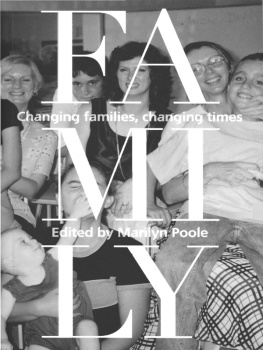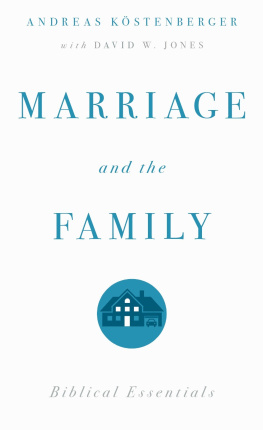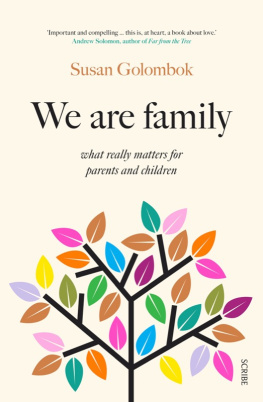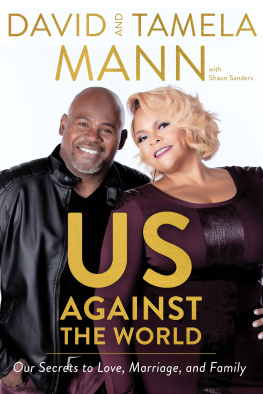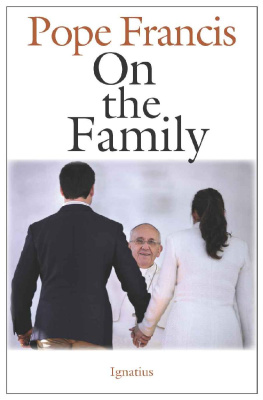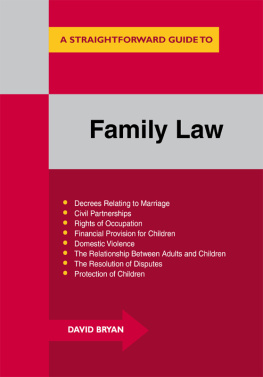First published 2005 by Transaction Publishers
Published 2017 by Routledge
2 Park Square, Milton Park, Abingdon, Oxon OX14 4RN
711 Third Avenue, New York, NY 10017, USA
Routledge is an imprint of the Taylor & Francis Group, an informa business
Copyright 2005 by Taylor & Francis.
All rights reserved. No part of this book may be reprinted or reproduced or utilised in any form or by any electronic, mechanical, or other means, now known or hereafter invented, including photocopying and recording, or in any information storage or retrieval system, without permission in writing from the publishers.
Notice:
Product or corporate names may be trademarks or registered trademarks, and are used only for identification and explanation without intent to infringe.
Library of Congress Catalog Number: 2004046055
Library of Congress Cataloging-in-Publication Data
Popenoe, David, 1932-
War over the family / David Popenoe.
p. cm.
Includes bibliographical references and index.
ISBN 0-7658-0259-7 (cloth : alk. paper)
1. FamilyUnited States. 2. MarriageUnited States. 3. United StatesSocial conditions1960-1980. 4. United StatesSocial conditions1980- I. Title.
HQ536.P65 2005
306.850973dc22
2004046055
ISBN 13: 978-1-4128-0810-1 (pbk)
ISBN 13: 978-0-7658-0259-0 (hbk)
, Family Decline in America, originally appeared in David Blankenhorn, Steven Bayme, and Jean Bethke Elshtain (editors), Rebuilding the Nest (Family Service America, 1990). Reprinted with permission of the Institute for American Values.
, American Family Decline, 1960-1990: A Review and Appraisal, originally appeared in the Journal of Marriage and the Family 55-3 (August 1993). Reprinted with permission of National Council on Family Relations.
, The Family Condition of America: Cultural Change and Public Policy, originally appeared in H. J. Aaron, T. E. Mann, and T. Taylor (editors), Values and Public Policy (Brookings Institution, 1994). Reprinted with permission of the Brookings Institution.
, Family Values: A Communitarian Position, originally appeared in David Sciulli (editor), Macro Socio-Economics: From Theory to Activism (M. E. Sharpe, 1995). Reprinted with permission of M. E. Sharpe, Inc.
, The Evolution of Marriage and the Problem of Stepfamilies: A Biosocial Perspective, originally appeared in A. Booth and J. Dunn (editors), Stepfamilies: Who Benefits? Who Does Not? (Lawrence Erlbaum, 1994). Reprinted with permission of Lawrence Erlbaum Associates.
, A World Without Fathers, originally appeared in The Wilson Quarterly, Spring, 1996. It is adapted from my book Life Without Father (Free Press, 1996).
, Fostering the New Familism: A Goal for America, originally appeared in The Responsive Community 2-4 (Fall, 1992).
, The Roots of Declining Social Virtue: Family, Community, and the Need for a Natural Communities Policy, originally appeared in M. A. Glendon and D. Blankenhorn (editors), Seedbeds of Virtue: Sources of Competence, Character and Citizenship in American Society (Madison Books, 1996). Reprinted with permission of Rowman and Littlefield Publishing Group.
, Modern Marriage: Revising the Cultural Script, originally appeared in D. Popenoe, J. B. Elshtain, and D. Blankenhorn (editors), Promises to Keep: Decline and Renewal of Marriage in America (Rowman and Littlefield, 1996). Reprinted with permission of Rowman and Littlefield Publishing Group.
, Challenging the Culture of Fatherlessness, originally appeared in W. F. Horn, D. Blankenhorn, and M. B. Pearlstein (editors), The Fatherhood Movement: A Call to Action (Lexington Books, 1999). Reprinted with permission of Rowman and Littlefield Publishing Group.
, The Marriage Movement, originally appeared as Marriage in Don Eberly (editor), Building a Healthy Culture: Strategies for An American Renaissance (William B. Eerdmans, 2001). Reprinted with permission of William B. Eerdmans Publishing Co.
, Can the Nuclear Family Be Revived? originally appeared in Society 36-5 (July/August, 1999).
, A Marriage Research Agenda for the Twenty-First Century: Ten Critical Questions, originally appeared in A. J. Hawkins, L. D. Wardle, and D. O. Coolidge (editors), Revitalizing the Institution of Marriage in the 21stCentury (Praeger Publishers, 2002). Reprinted with permission of the Greenwood Publishing Group.
, Remembering My Father: An Intellectual Portrait of The Man Who Saved Marriages, was presented in an earlier version at the Symposium on Fatherhood in America, Institute for America Values, New York City, December 1991. It is published here for the first time.
, The War Over the Family, was presented at the Tenth Annual International Meeting in Political Studies, Universidada Catolica Portuguesa, Lisbon, Portugal, November 2002. It is published here for the first time.
The articles in this book come from a career in which I have been a major warrior in what has been called the war over the family, that is, a heated national debate over the meaning and importance of marriage and the family in contemporary American life. The debate, essentially, is between those who believe that the weakening of the married-parent nuclear family should be a major focus of societal concern, especially in its effects on children, and those who do not.
The cultural war over the family is said to have begun in the 1960s when Daniel Patrick Moynihan, then a minor cabinet official in the administration of President Lyndon Johnson, wrote a report claiming the Negro family to be in the deepest trouble and involved in a tangle of pathology. At that time 25 percent of black births were out of wedlock and close to 30 percent of black children lived with a single parent. President Johnson drew on Moynihans views in his 1965 war on poverty speech, and the reaction from the cultural left was outrage. Moynihan was called, very simply, a racist, and was sent into intellectual exilealong with any official discussion of family weakeningfor years.
It was not just the black issue that triggered the family war, however. Radical feminists saw the nuclear family as patriarchal and oppressive, gays and lesbians saw it as discriminatory, and the growing number of divorced people and unwed mothers feared stigma and isolation. The ideology that nothing was going wrong with families, they were only diversifying, made its way strongly into the dominant culture of the intellectual elite in America. This was despite the fact that the rates of out-of-wedlock births and single parent households for whites soon climbed to the levels seen among blacks in the 1960s, and the national divorce rate skyrocketed to around 50 percent.
By the end of this book the reader will know in great detail where I stand in this debate. What she or he will not know from reading the articles in the book, however, is how I came to have the ideas and opinions that I now hold. That is the purpose of this introduction, a brief intellectual autobiography of how I came to be involved in one of the most contentious chapters in recent American social and cultural history. I will present two versions of how I started researching and writing about family issues and went on to become a national pro-marriage and family advocate. The first is the more objective and resume-based; the second is the more personalthe story behind the story.


